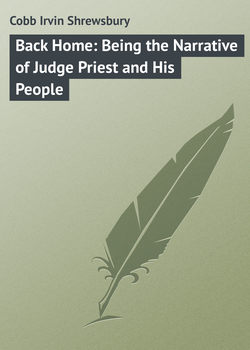Читать книгу Back Home: Being the Narrative of Judge Priest and His People - Cobb Irvin Shrewsbury - Страница 1
PREFACE
ОглавлениеAFTER I came North to live it seemed to me, as probably it has seemed to many Southern born men and women that the Southerner of fiction as met with in the North was generally just that – fiction – and nothing else; that in the main he was a figment of the drama and of the story book; a type that had no just claim on existence and yet a type that was currently accepted as a verity.
From well meaning persons who apparently wished to convey an implied compliment for the southern part of this republic I was forever hearing of “southern pride” and “hot southern blood” and “old southern families,” these matters being mentioned always with a special emphasis which seemed to betray a profound conviction on the part of the speakers that there was a certain physical, tangible, measurable distinction between, say, the pride of a Southerner and the blood-temperature of a Southerner and the pride and blood heat of a man whose parents had chosen some other part of the United States as a suitable place for him to be born in. Had these persons spoken of things which I knew to be a part and parcel of the Southerner’s nature – such things for example as his love for his own state and his honest veneration for the records made by men of southern birth and southern blood in the Civil War – I might have understood them. But seemingly they had never heard of those matters.
I also discovered or thought I discovered that as a rule the Southerner as seen on the stage or found between the covers of a book or a magazine was drawn from a more or less imaginary top stratum of southern life, or else from a bottom-most stratum – either he purported to be an elderly, un-reconstructed, high-tempered gentleman of highly aristocratic tendencies residing in a feudal state of shabby grandeur and proud poverty on a plantation gone to seed; or he purported to be a pure white of the poorest. With a few exceptions the playwright and the story writers were not taking into account sundry millions of southern born people who were neither venerable and fiery colonels with frayed wrist bands and limp collars, nor yet were they snuffdipping, ginseng-digging clay-eaters, but just such folk as allowing for certain temperamental differences – created by climate and soil and tradition and by two other main contributing causes: the ever-present race question and the still living and vivid memories of the great war – might be found as numerously in Iowa or Indiana or any other long-settled, typically American commonwealth as in Tennessee or Georgia or Mississippi, having the same aspirations, the same blood in their veins, the same impulses and being prone under almost any conceivable condition to do the same thing in much the same way.
Viewing my own state and my own people across the perspective of time and distance I had the ambition to set down on paper, as faithfully as I might, a representation of those people as I knew them. By this I do not mean to declare that I sensed any audible and visible demand for such a piece of writing; so far as I know there has been no such demand. It was my own notion solely. I wanted, if I could to describe what I believed to be an average southern community so that others might see it as I had seen it. This book is the result of that desire.
For my material I draw upon the life of that community as I remembered it. Most of the characters that figure in the events hereinafter described were copies, to the best of my ability as a copyist, of real models; and for some of the events themselves there was in the first place a fairly substantial basis of fact.
Having such an aim I wrote what I conceived to be a series of pictures, out of the life of a town in the western part of Kentucky; that part of Kentucky which gave to the nation among others, Abraham Lincoln and Jefferson Davis. These, pictures fell into the form of inter-related stories, and as such were first printed in the Saturday Evening Post. They are now offered here as a whole.
LSC
New York, November 1912
